|
“Dalton is an extremely gifted actor who has excelled in Shakespeare and
in a variety of film and TV roles across seven different decades now.
However, it has always intrigued me how little we really know about his
personal life and family background.
He is an intensely
private man and for many years this has added to the fog of mystery
surrounding him. For example, there has been a long-running disagreement
about his year of birth and even persistent rumours that his real name
isn’t Timothy Dalton at all!
Through my archival research for 007
MAGAZINE I’m delighted to say that I have been able to discover the truth
and have also uncovered some fascinating information about Dalton’s
ancestors, whose amazing accomplishments in the military and showbusiness
clearly provided the ideal breeding ground for a future 007!”
According to Timothy Dalton’s entry of birth he was born on 21 March 1946
(not 1944, as some websites and sources claim), the son of Peter Dalton
Leggett and his wife Dorothy (née Scholes). |
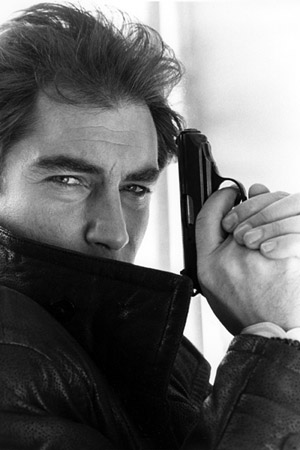 |
Confusingly, although
Dalton’s entry of birth records his name as Timothy Leonard Dalton, he is
listed in the England and Wales Civil Registration Birth Index as Timothy
L. D. Leggett. Whether his parents intended Leggett to be one of his given
names is unclear.
Williams also dug into the past of Dalton’s father and grandfather in
search of further information about the Leggett and Dalton surnames.
He discovered that although Dalton’s
father’s officially registered birth name was Peter Dalton Leggett,
his own father - Timothy Dalton’s grandfather - had no familial claim
to the Dalton name at all, and was actually named Albert Joseph
Leggett.
“The surname Dalton only became associated with the family when Albert
entered the world of showbusiness,” Williams explains. “Albert was
born in Battersea on 27 October 1877 and a detailed obituary published
in The Stage newspaper after his death in 1957 reveals much about
his fascinating life and background.”
According to this obituary, as a
youngster, Albert developed a passion for showbiz, skipping choir
practice to conduct “surreptitious” visits to the variety and music
halls. When his disapproving parents discovered what he had been doing
they confronted him with “forecasts of impending disaster” if he
attempted to pursue a career as a performer. |
|
|
To placate his parents,
Albert attempted to fulfil familial expectations with a period of
employment at a firm of City solicitors, but he soon abandoned the legal
profession for the bright lights of the music halls and theatres.
The Stage claim that Albert’s decision earned him the “sternest parental dis-association” and he subsequently adopted the name of ‘Will Dalton’,
possibly as a way of signalling a break from his parents. |
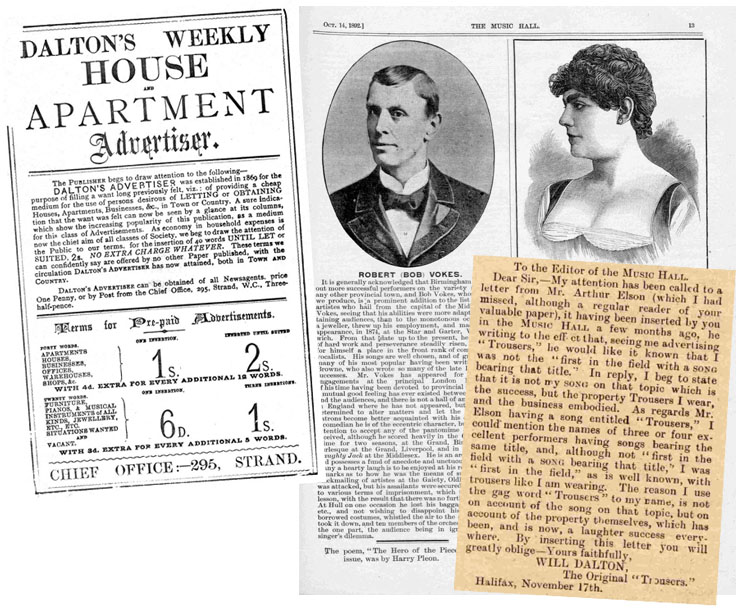 |
|
The Dalton surname was
“cribbed from the well-known publication” Dalton’s Weekly Advertiser, a
popular journal established in 1869 for “the purpose of… providing a cheap
medium for the use of persons desirous of letting or obtaining houses,
businesses, etc in town and country”.
Will Dalton soon carved out a niche for himself as a popular comic,
entertainer, dancer, actor and singer, treading the boards at venues as
diverse as the army base at Aldershot Plains, the Empire theatre in
Bristol, and in South Africa during the second Boer War.
In 1895 the Music Hall and Theatre Review,
a popular showbiz journal of the day, remarked, “Will Dalton is a smart
eccentric comedian, and is getting popular. His army song, ‘Johnny,’ is
well worked, and altogether is a good turn.” |
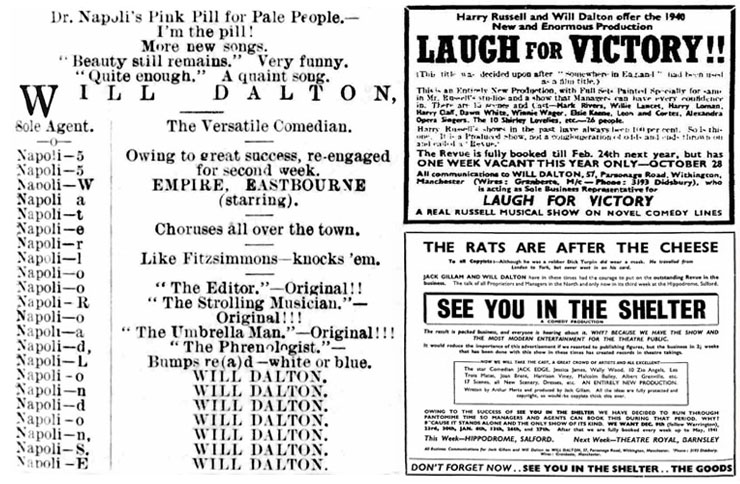 |
|
Will Dalton was managed
by the colourful Waterloo Road based agent Felix Napoli, the son of an
Italian strongman nicknamed ‘The Italian Hercules’. An 1897 trade ad in
the London and Provincial Entr’acte described Dalton as a “versatile
comedian”, who “like Fitzsimmons, knocks ‘em” (a reference to the
Cornish-born world heavyweight champion boxer Bob Fitzsimmons).
On stages across the British Isles, Dalton rubbed shoulders with many of
the leading entertainers of the day; in 1896 he appeared at the Alhambra
Theatre of Varieties in Sandgate on the same bill as Charles Chaplin Sr,
an entertainer whose son Charlie – of course – would go on to become one
of the greatest comedians and film stars the world has ever seen. |
|
By the turn of the
century, however, Will Dalton had decided to move away from performing and
instead establish his own theatrical booking and promotional agency. It
was in this sphere that he would work consistently and prolifically over
the next few decades until his death in 1957, finding, nurturing and
presenting myriad new talents, often from the provinces, including
ventriloquists, song and dance acts, comedians and many more.
Will’s decision to settle into life as an agent rather than a performer
was probably influenced by his December 1899 marriage to Amelia Hodgkiss
and the onset of family life.
Amelia - whose family came from
Birmingham - was also linked to the showbiz world. Her father -
Timothy Dalton’s maternal great-grandfather - was a famous comedian,
Bob Vokes, and Amelia herself “a pleasing ballad vocalist”, who
performed under the name ‘Millie Vokes’.
Will Dalton’s Agency was based in Manchester, firstly in Matlock
Avenue in West Didsbury and then a mile down the road in Parsonage
Road, Withington.
Dalton had a reputation for being “honest and straight” and was
regarded as extremely hard-working and enterprising. In a 1906 letter
to The Era he claimed, “I found more new turns while an agent than
any other person in my line of business has done in the same space of
time”. |
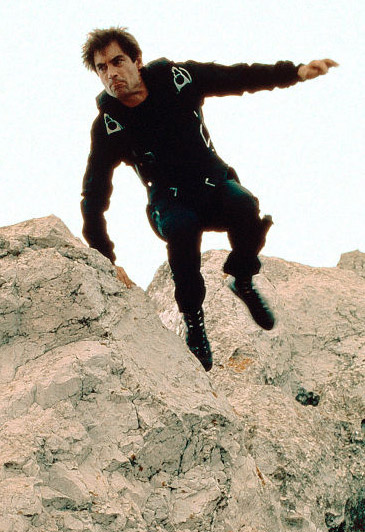 |
|
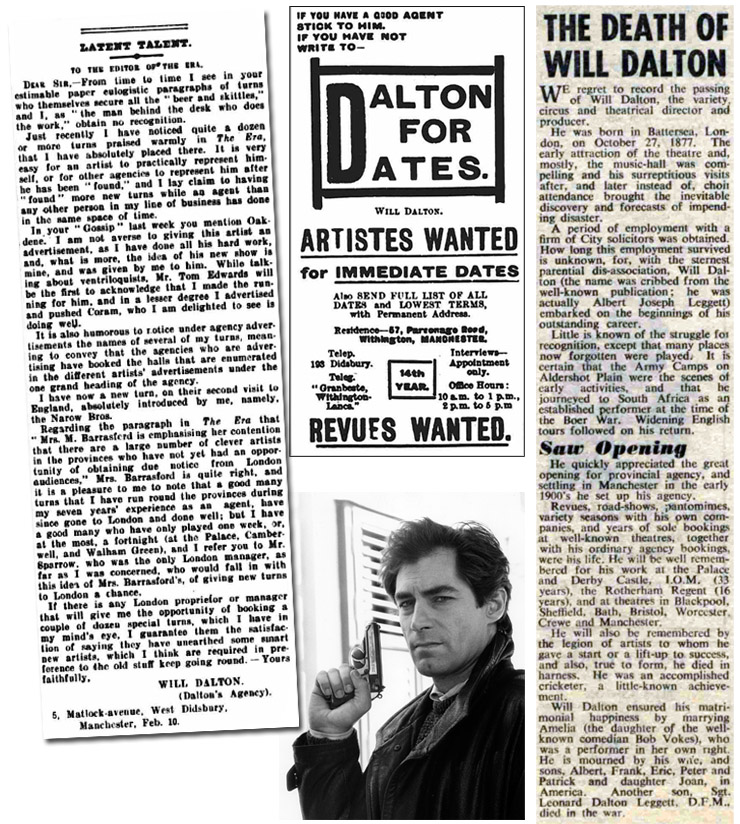 |
|
Ads for Dalton’s Agency appear regularly in early 20th century editions of
showbiz journals and advertisers; one such ad – in The Era in 1914 -
declared: “If you have a good agent, stick to him. If you have not, write
to: Dalton for Dates!”
Will Dalton enjoyed some major successes
during World War II, co-producing two popular comedy revue shows entitled
‘Laugh for Victory’ and ‘See You In The Shelter’ in 1940 and 1941. Of the
latter show, which starred Jack Edge, who regularly featured on BBC Radio
and was regarded as one of the ‘King Pins of Comedy’, the Crewe
Chronicle wrote: “The ready adaptation of Britishers to the new mode of
living is vividly portrayed … full of funny and original scenes”.
Birth records suggest that Will and Amelia possibly had as many as eight
children, although The Stage obituary refers to seven. 007 MAGAZINE’s
research has revealed some fascinating details about how World War II
touched the lives of two of their sons - Peter and Leonard. |
|
CONTINUED |


